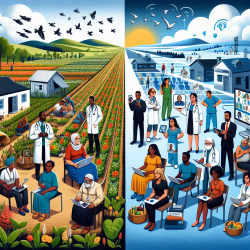Mental health disorders among children and adolescents are a global concern, with significant implications for individuals and societies. In developing countries, where resources are limited and cultural contexts vary widely, the challenges of effectively screening for these disorders are particularly acute. A recent study titled The ethical, social, and cultural dimensions of screening for mental health in children and adolescents of the developing world offers invaluable insights into these challenges and proposes solutions that practitioners can implement to enhance their skills and improve outcomes.
Understanding the Challenges
The study identifies 39 significant challenges related to mental health screening in developing nations, categorized into eight themes. These challenges include the inadequate design and validation of screening tools, weaknesses in screening programs, lack of integration with national health systems, and issues related to stigmatization and discrimination. Each challenge is compounded by the unique ethical, social, and cultural contexts of low- and middle-income countries (LMICs).
Proposed Solutions
The research outlines 32 potential solutions organized into seven themes. Key recommendations include:
- Designing Culturally Appropriate Tools: Develop affordable and scalable screening tools that are culturally valid and age-appropriate. Pilot these tools within local communities to ensure their relevance.
- Integrating Screening into Primary Care: Incorporate mental health screening into community-based primary healthcare systems to enhance accessibility and reduce stigma.
- Building Capacity: Train local non-specialists to conduct screenings effectively, thereby expanding the reach of mental health services.
- Ensuring Human Rights: Implement screenings within a human rights framework that respects privacy, consent, and confidentiality.
Encouraging Further Research
The study highlights the need for ongoing research to refine screening processes further. Practitioners are encouraged to engage with local communities to understand better the social determinants of mental health disorders. Collaborations between high-income countries (HICs) and LMICs can facilitate knowledge exchange and resource sharing.
The Path Forward
The consensus among experts underscores the importance of adapting existing models to fit local contexts while ensuring ethical integrity. By implementing these solutions, practitioners can play a pivotal role in reducing the burden of mental health disorders among children and adolescents in developing countries. This approach not only improves individual outcomes but also contributes to broader societal well-being.
To read the original research paper, please follow this link: The ethical, social, and cultural dimensions of screening for mental health in children and adolescents of the developing world.










